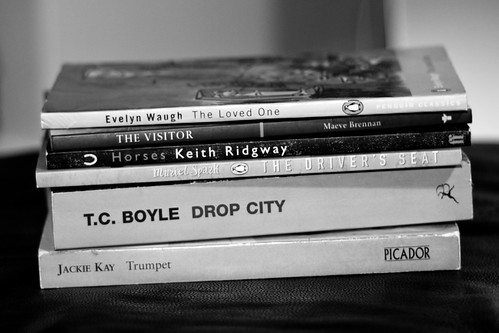I turn thirty years old this month and there are a myriad of reasons why I am not okay with that but, making lemonade from lemons, it inspired a new feature for my blog. In my twenty-nine years so far I have read a lot of books and obviously only books from two of those years have been shared with you in Paperback Reader posts. In Thirty for Thirty I am going to take thirty books read during my almost-thirty years that have made an impression and highlight them. This is the first of five installments.
I consider the top four books in the pile to be among the very best novellas I have read and have probably recommended them as such whenever some of you have been seeking out novellas to read, whether that be for general reading or for challenge or novella weekend reading. I have a deep love for Irish literature and both Maeve Brennan and Keith Ridgway are Irish; the former I came across reference to when I was researching Angela Carter for my thesis and Horses was a set text for an Irish literature (since the 1950s) course. Both are original and difficult to define but have been written about by Simon and Kim, who has written about both, and who have fresher, more recent insights. The same Irish professor who taught that course recommended TC Boyle and Drop City to me and gave a lecture on The Driver’s Seat by Muriel Spark earlier in my university career. As you may know, I am a huge fan of Muriel Spark and The Driver’s Seat is her darkest subject matter and most thought-provoking of novellas; it was also adapted into a film with Elizabeth Taylor. The Loved One is also a blackly humorous novella set in Los Angelean funeral home, Whispering Glades (I think I first came across mention of the novella looking at DVD boxsets of Six Feet Under years ago). A satire on the (then) Anglo-American cultural divide and on glamorous Hollywood, The Loved One is refreshing and quintessentially Waugh with its dry wit.
I was reminded recently of Drop City by T. C. Boyle when I read Caribou Island by David Vann (review forthcoming), not only because of their mutual Alaskan setting or because of the direct reference to Boyle early on -uncanny when I was at that stage thinking the novel was reminiscent of him – but an overall similarity in tone and a deft balancing of light and dark themes. Both Boyle and Vann are thoroughly absorbing and compel you to read on. Drop City is about a commune of artists in the 1970s who relocate from California to remote Alaska but there is only so much free love and tree-hugging one can indulge in with bears in the vicinity and subzero conditions. If you have not read any T.C. Boyle then I cannot recommend Drop City highly enough but the same applies to all of my thirty for thirty selections.
Trumpet by Jackie Kay is a novel that you may not have heard about (for the most part I have tried to focus upon the lesser-reviewed works that have impacted me rather than add my voice to the large chorus of fans of Pride and Prejudice, Rebecca and Midnight’s Children, for example) although it won the Guardian Fiction Prize in 1998 and was shortlisted for the International IMPAC Dublin Literary Award in 2000. Jackie Kay is a Scottish writer (half-Nigerian), brought up in Glasgow, and I enjoy her poetry because of the shared cultural identity and its focus on race. Trumpet was her debut novel and is jointly set in London and -through memory flashbacks- in 1960s Glasgow and tells the story of acclaimed trumpeter, Joss Moody, who is revealed upon his death to have been a woman living as a man. Exceptionally poignant, Trumpet explores the aftermath of the revelation of Joss Moody’s true sex and the impact that has on his adopted son, Colman, who is both grieving and struggling to accept his father’s huge secret. It features on LGBT literature lists often and was recommended to me by a friend who grew up in the same suburb of North Glasgow as Jackie Kay. Trumpet is an emotive exploration of transgenderism, race and loss/grief and is a beautiful, gentle alternative (or additional read, of course) to Middlesex by Jeffrey Eugenides.
There you have it: the first six of thirty books that make up (almost) thirty years of impressionable reading -including being read to, if you want to be technical about it (seeing as I didn’t read alone for the first few years).



















